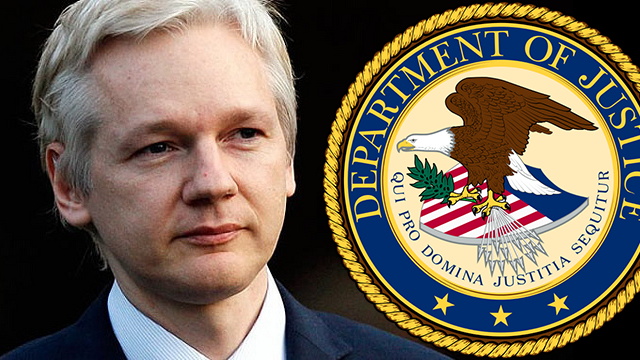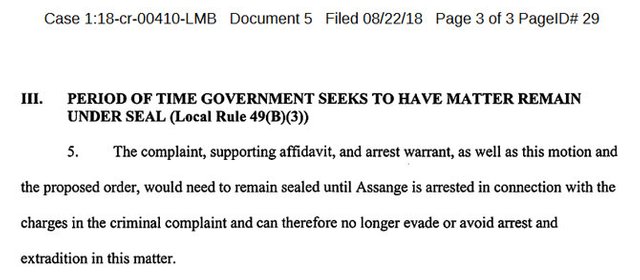DOJ Lacks Justification for Secrecy of Assange Charges, Argue Lawyers Trying to Unseal Them at 2nd Hearing
Last month, the Reporters Committee for Freedom of the Press (RCFP), a nonprofit organization representing journalists’ interests, filed a motion to get access to "any criminal complaint, indictment or other charging documents" against WikiLeaks founder Julian Assange. U.S. District Judge Leonie Brinkema was to hear on the motion to unseal the charges a few days later, and render a decision.

newsonline/flickr, CC BY 2.0
Charges Against Assange
We found out there are charges, because Assange's name appeared in an unrelated case filed by the United States Attorney G. Zachary Terwilliger who used documents to seal Assange's charges as a template. His name was left in place due to an apparent copy/paste screw up:
The complaint, supporting affidavit, and arrest warrant, as well as this motion and the proposed order, would need to remain sealed until Assange is arrested in connection with the charges in the criminal complaint and can therefore no longer evade or avoid arrest and extradition in this matter.

Source
Prosecutors said no one has a right to know if someone has been charged until they get arrested. Prosecutor Gordon Kromber said:
"Any contrary rule would completely undermine the proper functioning of the criminal process at this stage: anyone could petition the Court to require the government to confirm whether the time was right to flee or evade arrest."
The prospectors also say that if there are no publicly available record for changes, then the person hasn't been charged or that those charges are under seal, as Kromberg adeed:
"In either event, the government is not required to publicly acknowledge which of those two possibilities happens to be the case with respect to any individual. The First Amendment does not require the government to confirm or deny the existence of criminal charges in this case."
First Hearing
At the hearing, Judge Leonie M. Brinkema from the Eastern District of Virginia heard arguments to unseal the charges, but delayed making a decision on the case. She would hear more from the lawyers trying to get the charges unsealed, and from the prosecutors who want to keep the seal in place, the following week.
At that initial hearing, Prosecutor Gordon Kromber argued to the judge that "any discussion of why it would be sealed cannot be done in a public forum. This court ... doesn’t know what needs to be said." Brinkema seems to agree, reasoning that in cases with multiple defendants a seal can last beyond one defendants arrest. Her main concern is "is making sure that person is brought to justice". If a seal needs to be kept in place to ensure that, then it will be. Brinkema said:
"... there’s no question the public has a right to see charging documents, but that right doesn’t apply before an arrest has been made."
Second Hearing
The following hearing was held last Monday, December 3, 2018. Attorneys for the RCFP argued further for the unsealing of the charged against Julian Assange with an additional 12-page memorandum filed in the Alexandria, Virginia court, saying the DOJ "lacks justification for continuing to keep its case completely sealed." RCFP lawyer Caitlin Vogus wrote in the memo:
"The Reporters Committee does not dispute that, in some cases, prior to an arrest the Government may have a compelling interest that justifies temporary sealing of court records subject to the First Amendment right of access. But such interests are not present prior to an arrest in all cases, and the Government cannot justify wholesale sealing of the Assange Prosecution, specifically, based on nothing more than the fact that Assange is not in U.S. custody."
"The Government does not demonstrate a compelling interest that would justify keeping the entirety of the Assange Prosecution sealed by mulishly asserting the fiction that Assange—who has confined himself to the Ecuadoran Embassy in London—might attempt to evade arrest if the nature of the charges pending against him are made public. Given the specific circumstances here, unsealing court records from the Assange Prosecution, including the ‘contents’ of the criminal complaint against Assange, would not ‘pose any extra threat’ that he will evade or avoid arrest, or implicate any other compelling interest of the Government."
The arguments from RCFP make complete sense. If the original motion to seal the charges is why they needed to be sealed -- so that he could "no longer evade or avoid arrest and extradition in this matter" -- the fact that has been hold-up in the Ecuadoarian embassy in order to avoid being arrested or extradited for the past 6 years without the charges being revealed makes no difference to the charges being unsealed. He has been there the whole time they were sealed, and would remain there after they get unsealed. He's not all of a sudden going to leave the embassy, just because they get unsealed, as a way to "avoid arrest and extradition".
The DOJ has a week to respond to the latest filing by the RCFP, said Clinton-appointed Judge Brinkema.
Vogus added, outside of the memo, that:
"The Reporters Committee has been unable to locate any published decision in which a court has granted (or denied) a motion by a member of the news media or public to unseal a criminal complaint or other charging document prior to arrest. The Government, however, has not cited, and the Reporters Committee is unaware, of any case holding that the public’s constitutional and common law rights of access to court records in criminal matters are either inapplicable or overcome merely because a defendant is not in custody."
The "fact that Assange has been charged with an unspecified crime or crimes has raised questions about the Government’s potential willingness to pursue charges that may be based on the publication of information— questions that implicate First Amendment concerns, and can only be answered by unsealing the criminal complaint against Assange."
The case of the persecution of Julian Assange by the DOJ is so messed up. I thought the times of Watergate-esque threats, bullying and violence by the government to silence journalists and publishers was over, but apparently not. If any American media outfit was being harassed and threated with charges like the Espionage Act for publishing information the government wanted to keep secret, I'm pretty sure they would be up in arms about it.
I guess they've learned little from the Watergate-era threats against freedom of the press. Or maybe it's just because WikiLeaks isn't considered a "bonafide" member of the press establishment that they just ignore defending one of their own. they don't see the nails being placed into their own coffins. Criminalizing the publishing of leaked documents would set a precedent to silence others. A dark blanket would cover the shedding of light on the ugly darkness that governments and others do. When state authority and tyranny isn't kept in check, freedom ends up in chains.
References:
- Lawyers seeking access to sealed Julian Assange case argue DOJ lacks justification for secrecy
- Assange Secretly Charged by U.S., Sealed Court Documents Reveal in Copy-Paste Bungle
- U.S. Prosecutors Fight to Keep Assange's Charges Sealed, Saying Media Has 'No Legal Right' to Know
- Judge Delays Decision to Unseal Charges Against Julian Assange
Thank you for your time and attention. Peace.
If you appreciate and value the content, please consider: Upvoting, Sharing or Reblogging below.
 me for more content to come!
me for more content to come!
My goal is to share knowledge, truth and moral understanding in order to help change the world for the better. If you appreciate and value what I do, please consider supporting me as a Steem Witness by voting for me at the bottom of the Witness page.

But those are just facts and have little to do with the feelings involved, lol. Say three "muh Russias" and you will be forgiven this blasphemy.
It's almost as if they don't care how anything looks to those who can still think. Almost like they think the odds are against the thinkers.
I'm sending the thought police. Jail to all thinkers!
Maybe it's time convene a citizen's grand jury of such size and scope that even the AG will have to toe the line and start doing things Constitutionally.
I think those need to be approved by judges? It may help the whole mess, as long as it's not brainwashed TV goers going :/
Right. LOL.
Here is how the mouth breathers at Wiccapedia describe it:
"In the United States, a citizen grand jury is a non-actionable, non-governmental organization that assumes a responsibility upon itself to accuse an individual or groups of individuals of having committed actionable crimes, in a similar aim as that of official grand juries. Such organizations have been organized by those who espouse conspiracy theories regarding certain events or the individuals who are accused by the citizen grand jury, and most citizen grand jury applications to official judiciary systems at the federal, state, or local and municipal level tend to be thrown out for lack of evidence.
Modern citizen grand juries were organized in the 2000s to accuse government officials of complicity in the September 11 attacks, and others were organized in the late 2000s and early 2010s regarding the accuracy of President Barack Obama's "natural birth" as a U.S. citizen."
Time to start getting "actionable," I guess...